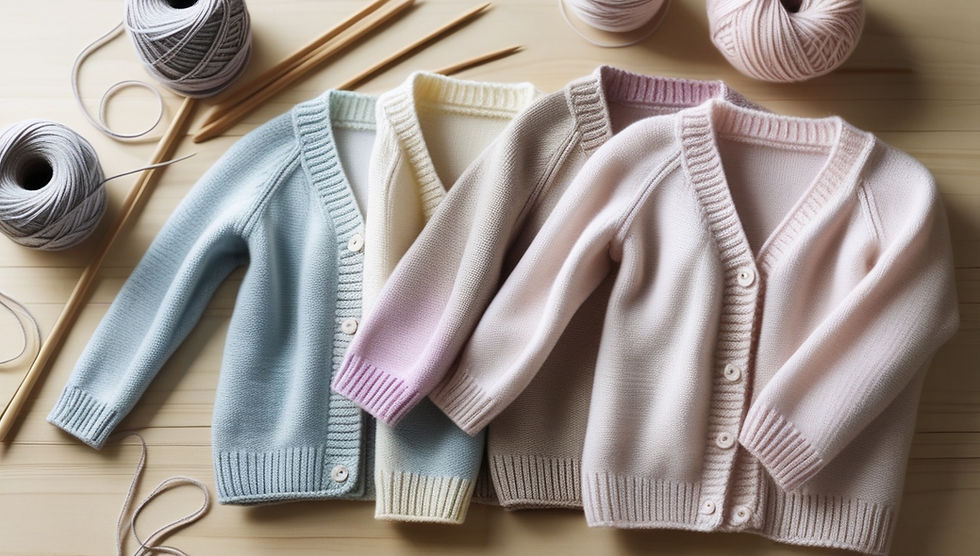MOQ (Minimum Order Quantity) Explained: A Guide for Buying Cardigans in Bulk
- yhknits
- 6 days ago
- 4 min read

When it comes to purchasing products in bulk, especially in the apparel industry, one of the first terms buyers encounter is MOQ, or Minimum Order Quantity. If you are planning to source cardigans for your fashion store, wholesale business, or private label brand, understanding MOQ is essential. It not only determines how much you need to invest but also impacts your profit margins, supply chain efficiency, and relationship with suppliers.
In this detailed guide, we’ll break down what MOQ means, why manufacturers set it, how it affects buyers of cardigans, and what strategies you can use to negotiate or work around it.
What is MOQ?
MOQ stands for Minimum Order Quantity, which refers to the smallest number of units a manufacturer or supplier is willing to produce or sell at one time. For example, if a supplier has an MOQ of 300 cardigans, you must order at least 300 units to start production.
MOQ is not a random number. It is set based on factors like production costs, fabric sourcing, labor, and economies of scale. For businesses that want to launch a cardigan line or stock up on bulk inventory, MOQ is one of the most important factors to understand.
Why Do Manufacturers Set MOQs?
Manufacturers, especially in textiles and knitwear, face several costs before they can deliver a finished product. Here’s why MOQs exist:
Fabric Sourcing – Buying yarn or fabric in small quantities is costly, but purchasing in bulk lowers costs per unit.
Production Efficiency – Running machines, setting up designs, and assigning labor all require minimum volumes to make production worthwhile.
Profit Margins – A manufacturer needs to ensure that the order is financially sustainable, covering material, labor, and overhead costs.
Inventory Risk – By setting MOQs, manufacturers reduce the risk of producing small, unprofitable orders.
For cardigans specifically, the materials (wool, cotton, acrylic, blends) and design complexity (buttons, patterns, knitting styles) often influence the MOQ.
Typical MOQ in Cardigan Manufacturing
MOQ varies depending on the manufacturer, country, and type of cardigan. Here’s a general idea:
Basic Cardigans (simple patterns, common fabrics): 100–300 pieces
Designer or Custom Cardigans (unique yarns, embroidery, special dyeing): 300–500 pieces
Private Label Cardigans (with branding, tags, packaging): 200–400 pieces
Some factories may offer lower MOQs if you choose from pre-existing designs, while others might require higher volumes for custom work.
How MOQ Affects Buyers
Understanding MOQ helps you plan your business strategy. Here’s how it impacts different types of buyers:
1. Small Business Owners
If you’re running a boutique or a startup brand, high MOQs can be challenging. Ordering 500 cardigans might tie up too much capital or lead to overstocking.
2. Wholesalers
Wholesalers usually benefit from MOQs because they can distribute large orders across multiple retailers, reducing per-unit costs.
3. E-commerce Stores
For online businesses, MOQs require careful forecasting. Ordering too many cardigans might lead to excess stock, while too few may not meet demand.
How to Negotiate MOQ with Manufacturers
MOQ is not always fixed. Here are some strategies to negotiate:
Start with Sample Orders – Many manufacturers allow smaller sample runs at higher prices. This is ideal for testing product quality.
Offer to Pay More Per Unit – Some suppliers agree to reduce MOQ if you accept a slightly higher per-unit price.
Combine Orders – If you’re working with partners or other businesses, pooling orders can help meet MOQ requirements.
Use Existing Materials – Ask the manufacturer if you can use leftover fabrics or designs, which often lowers MOQ.
Build Long-Term Relationships – Reliable buyers who plan to place repeat orders often get flexibility in MOQ.
Balancing MOQ and Business Goals
When planning your cardigan business, balance MOQ with your goals and resources. Ask yourself:
Do I have the storage space for large quantities?
Can I realistically sell this volume within a season?
What is my cash flow capacity for bulk purchases?
Am I focusing on custom designs or standard styles?
For example, if you’re launching a new line of eco-friendly cardigans, you may prefer a smaller MOQ at first to test demand before scaling up.
Tips for First-Time Buyers of Cardigans in Bulk
Research Multiple Suppliers – Don’t settle for the first offer. Compare MOQs across different factories.
Factor in Hidden Costs – Remember shipping, import duties, and storage fees.
Order in Advance – Knitwear production often takes longer, especially during peak seasons.
Focus on Quality, Not Just MOQ – A low MOQ is useless if the product quality is poor.
Understand Seasonal Trends – Cardigans are in higher demand in fall and winter, so align bulk purchases with these cycles.
MOQ and Private Label Cardigans
If you’re planning to launch your own cardigan brand, private labeling is an attractive option. Many suppliers offer private label services, including custom tags, packaging, and embroidery. However, MOQ is usually higher for private labels because of customization costs.
For startups, it’s wise to begin with small runs using pre-designed cardigans before moving into fully customized private label products.
Final Thoughts
MOQ may seem intimidating at first, but it’s a vital concept in bulk apparel sourcing. By understanding why manufacturers set it, how it impacts pricing, and what negotiation options are available, you can make smarter decisions for your cardigan business.
Whether you’re a small boutique owner or an e-commerce entrepreneur, MOQ plays a significant role in shaping your sourcing strategy. By balancing your budget, demand forecast, and supplier options, you can ensure that your investment pays off.
If you’re looking for reliability, always work with an experienced cardigan sweater manufacturer who understands both market trends and production efficiency. The right partner will not only meet your MOQ needs but also help your business grow with quality products and timely delivery.




Comments